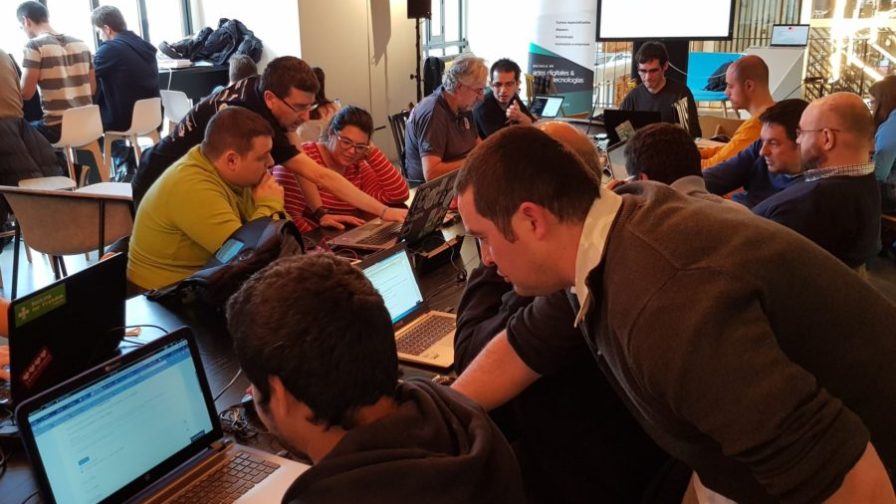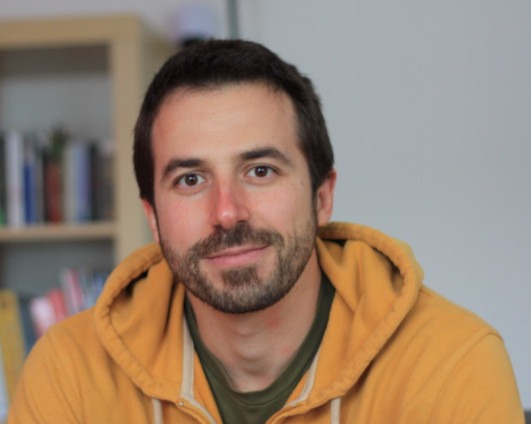
Fabio Tiriticco is a software engineer, conference speaker and community leader of Reactive Amsterdam (check its page on Codemotion’s platform). While building his own startup, Fabio fell in love – with Akka, Scala and Reactive systems, so much so that he founded the 2,000-strong Reactive Amsterdam meetup group.
He specialises in architectures for distributed reactive systems, bridging application level and cloud orchestrators like Kubernetes.

He is passionate about the importance of integration between application logic and infrastructure. He has spoken about this subject at many conferences, including Codemotion. When not in front of a screen, Fabio enjoys long-distance bike rides and fingerpicking his guitar.
Before you keep on reading, let us suggest you read our full guide on how to be a better developer community manager and go through our list of the best tools for planning a virtual conference.
Reactive Amsterdam Community
Hi Fabio! Please tell us about your tech community, its members and objectives.
My community is called Reactive Amsterdam as it finds its inspiration in the Reactive trends in the tech industry: Reactive Programming, the Reactive Manifesto, the Reactive Streams standard and so forth. There are around 2,100 members at time of writing.
The main focus of this crowd is backend system programming with a strong tie to infrastructure issues. Performance, scalability and resilience are very important topics. We look at them from an architectural point of view more often than from an implementation perspective.
Being a Tech Community Manager
What is it like being a tech community manager in your country? What is the tech scene in your country?
The Netherlands is a tiny country but its tech scene is incredible and very responsive. It has always been easy to find venues or companies able to sponsor our events.
This quality can be double-edged as well. Because of this great response, all sorts of companies are taking note and entering the community space. Their budget allows for bigger events and wider marketing reach than grassroots communities like mine can afford. They have dedicated people to the job while other organisers like me do this work in their free time.
What were the biggest problems you’ve had to overcome and how have you done this?
Haha – in fact I have a whole presentation about this! I gave it at the Italian Community Manager Summit 2019 in Milan. Of the 10 issues I go over there, the source of the biggest frustrations is probably (and predictably) related to our own expectations towards other people that we interact with.
Maybe it’s our co-organisers, maybe it’s the contact point at some sponsor – it could literally be anyone. The solution to this lies within ourselves as well: empathy. Becoming a more compassionate and empathic person is almost essential for emotional survival. Empathy really is your most powerful tool in an organising role.
Diversity in Tech Communities
Do you encourage Diversity in your tech community, and during your meetups? How important is it to have a code of conduct? Have you ever had to apply it?
My community is clearly plagued by a lack of diversity. In particular, the lack of gender diversity makes me very sad. Dealing with it is very, very difficult though. I have a Code of Conduct, but I believe that its role is mostly symbolic.
CoCs are the second-most ignored thing after Terms and Conditions. They are a statement of good intentions, maybe useful as a last resort in certain disputes, but I think their contribution to diversity is quite minimal.
Why and how to become a Community Manager
Why did you decide to become a community manager, and what is the most valuable thing you got in return? How do you balance your work time and personal life with being a community manager?
I joined lots of tech communities in Amsterdam. Then one year I saw that one topic that I was really interested in didn’t have a community of reference, so I jumped right in. A bit like in the startup world, a scratch-your-own-itch kinda thing. The most important thing I got in return is meeting a lot of incredible people in Amsterdam and beyond.
What skills and experience does a tech community manager need? What is the secret to building relationships in a tech community, and how do you maintain these relationships?
Lots of things would be a great help (empathy above all), but I would say that the only required one is enthusiasm and genuine interest in learning! Other skills and managing experience can all be learned along the way.
The secret to building strong relationships for me is to acknowledge that you can’t have a strong relationship with everyone. Be friendly with everyone, but try and focus more on a subset of people.
Please list some do’s and don’ts for aspiring tech community managers. What distinguishes a good tech community from a bad one?
Do’s:
- If your passion shifts, make your community shift too!
- Look aggressively for collaborators or co-organisers and keep looking when you don’t find any
- Constantly refine your expectations about anything (attendance, signups, food..)
Dont’s:
- Avoid putting an entry price to your events (if you can)
- Do not feel pressure to keep expectations. Like it’s ok to skip one month.
- Do not take personally any annoying behaviours by your members or collaborators
The success of a tech community
What do you consider the best metrics for evaluating the success of a tech community?
- Numbers are cold but quite objective
- Amount of members
- Signup and effective attendance to events (for live events)
- Numbers of times that discount codes are redeemed
What are the most important tools of the trade, for you?
I mostly rely on Meetup and Twitter.
What books, articles, videos, experts and conferences would you suggest to other tech community managers?
The book The Business Value of Developer Relations by Mary Thengvall is a really good snapshot of the developer relations situation now, especially if you’re interested in the enterprise perspective.
Do you think tech communities can have a role in shaping a better tomorrow?
I am prompted to instinctively reply with a bright “YES!”, and the answer is certainly a YES, but the fact that big corporations and enterprises have realised the power of communities and are applying their muscles to drive them makes me a little concerned.
In this era where power lies with those able to control information, communities can be steered towards dangerous directions and tech isn’t immune to this.
What advice do you wish you had been given when you started your community?.
Enrol in the empathy gym IMMEDIATELY! 🙂
